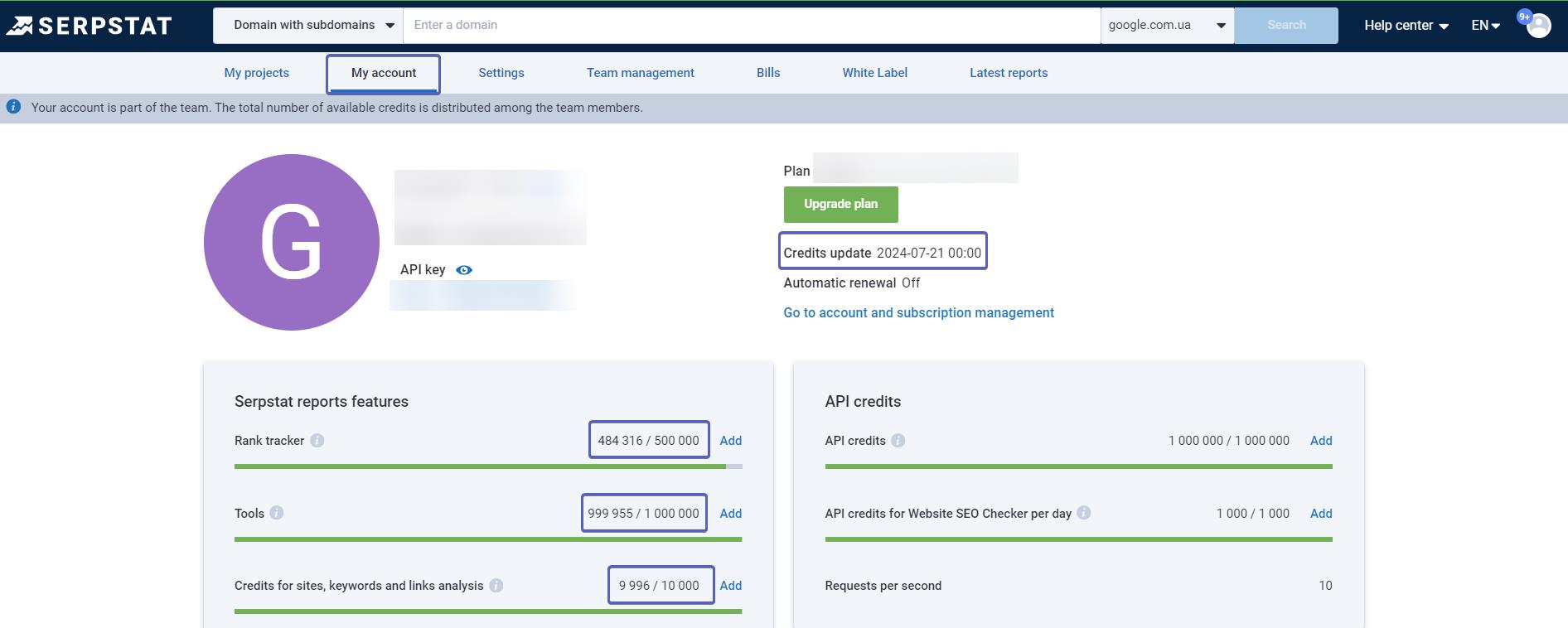Tutorial
1. What are Serpstat credits, and what are the credit types
The measurement units of received data in Serpstat are called credits. Depending on the type of data requested, the concept of credit may include the following meanings:
- For Search analytics sections: 1 query = 1 credit.
At the same time, the scheme for charging credits is different for different modules. You can read more about this below in paragraph 3.
- For API: 1 row with result = 1 credit.
For example, Top by keyword report charges ≤ 100 credits as the report displays the top 100 keywords.
2. How credits are charged
Credits are added to your account immediately after paying for the subscription. After the end of the subscription month, the number of credits is updated, not summing up with the rest of the credits from the previous month. The number of credits depends on your pricing plan. You can learn more about the number of credits depending on the subscription on the pricing page.
You can check the remaining credits for this month on your account in My account. For example, if it is indicated that the credits for the Rank tracker module are 60/100, this means that there are 60 credits left out of 100.
You can also see the date when your credits will renew.
3. Peculiarities of spending credits in Serpstat modules
Here is a summary of the credit spending formulas. You can read more about this in the article.
- In Search analytics module (Domain analysis, URL analysis, Keyword research, Backlink analysis) credits are renewed daily; their number depends on the pricing plan. Batch analysis charges 5 credits for each selected database.
- In Rank tracker module, credits are renewed monthly. Credits are charged for each keyword update and for each analyzed region. For example, the update of 10 keywords in 2 regions = 20 credits.
- In Site audit module, credits are renewed once a month. For 1 scanned page 1 credit is charged. For example, audit of 1000 pages = 1000 credits. For 1 scanned page developed in Javascript, 10 limits per page are charged.
- Tools module (Domain batch analysis, Keyword batch analysis, Clustering and Text analytics, AI content tools) the algorithm for charging credits is as follows:
Domain batch analysis
Number of domains * Number of metrics * Number of search databases = Number of credits
For example, 3 domains by 2 metrics by 1 database = 6 credits
Keyword batch analysis
Number of keywords * Number of databases * 2 = Number of credits
For example, 5 keywords by 3 databases * 2 = 30 credits
Clustering and Text analytics
Number of keywords * 5 = Number of credits
For example, 30 keywords * 5 = 150 credits
4. Peculiarities of spending credits for API
When working with the API, there are two types of credits: the number of queries per second and the number of rows.
- The number of concurrent API threads per second is called the number of requests.
- The number of results in the returned query response is called the number of rows.
For 1 request, 1 credit is charged. The Summary report charges 5 credits. For each line or block of the response, 1 credit is charged. Read more about the algorithm for charging credits for API in the API documentation. There is a restriction on the number of API results: up to 60,000, and to get more results, you need to use data export.
5. Serpstat subscriptions and credits
Depending on the subscription, you get a certain number of credits for each module. Here is a summary of the number of credits for subscriptions; more detailed information can be found on the Pricing page.
Individual plan:
Number of projects — 5
Queries per day — 100
Results per report (Search analytics) — 2,000
Results per report (Backlink analysis) — 2,000
Export rows per month — 50,000
API requests per month — 0
Position checks per month — 10,000
Pages to Audit — 30,000
Tools credits — 5,000
Team plan:
Number of projects — 9,999
Queries per day — 500
Results per report (Search analytics) — 10,000
Results per report (Backlink analysis) — 10,000
Export rows per month — 250,000
API requests per month — 200,000
Position checks per month — 50,000
Pages to Audit — 150,000
Tools credits — 25,000
Agency plan:
Number of projects — 9,999
Queries per day — 5,000
Results per report (Search analytics) — 100,000
Results per report (Backlink analysis) — 10,000
Export rows per month — 2,500,000
API requests per month — 2,000,000
Position checks per month — 500,000
Pages to Audit — 1,500,000
Tools credits — 250,000
6. How to buy additional credits for a specific module
If the credits for a certain module are running out, and you do not want to wait for a new billing month, buy additional credits.
Go to My Profile and click the Add button next to the module you are interested in. A support chat will open, there you can get additional credits.
In addition, you can buy more credits by clicking on the Buy additional credits section in the left sidebar of the tool.
You can read more about how to buy credits in the Serpstat Credits FAQ article.
If you have questions about credits and subscriptions, please contact the support chat.